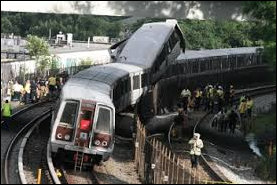 Succumbing to political pressure from Virginia, the Washington Metro board has voted to reduce the participation of so-called “alternate” board members. The move, which will enhance the power of the eight “principal” board members, was necessary to comply with the Commonwealth’s demand for board restructuring as a condition for receiving $500 million a year in dedicated funding.
Succumbing to political pressure from Virginia, the Washington Metro board has voted to reduce the participation of so-called “alternate” board members. The move, which will enhance the power of the eight “principal” board members, was necessary to comply with the Commonwealth’s demand for board restructuring as a condition for receiving $500 million a year in dedicated funding.
The measure passed Thursday, reports the Washington Post, bars alternates from participating in board or committee proceedings. The change, proponents say, will streamline discussions, reduce parochialism, and increase the level of expertise among board members.
“Over the long term, the jurisdictions will compensate for the supposed loss of access to expertise by putting forward, as members of the board, individuals who possess levels of expertise and experience of complex organizations that few, if any, members of the board today possess,” said David Horner, a federal representative on the board. “At the end of the day, that is a better model for governance of a complex transit property.”
But not everyone was happy with the change. “I strenuously object to the changes in the bylaws that you are considering, which will basically circumvent the compact that governs this body,” said alternate board member Malcolm Augustine, who represents Prince George’s County. “Virginia is holding all of us hostage, and it will disenfranchise Prince George’s County.”
Bacon’s bottom line: I haven’t attended Metro board meetings, so I haven’t seen the board in action, and I don’t have an informed opinion on whether a streamlined board will improve the quality of its decisions. But I am dubious that much will change. Metro’s structural problems run too deep.
First, Metro has set its fares too low, thus depriving the mass transit organization of desperately needed funds. The board is worried about two things: that increasing fares will depress ridership, and that higher fares will punish lower-income riders. Sidelining the alternate board members doesn’t change that calculus.
Second, fundamental reform is subject to a union veto. An unwillingness over the years to confront the Amalgamated Transit Union, which has the power to shut down the Metro and throw the Washington economy into a tailspin, has resulted in excessive pay, featherbedding, favoritism, and unproductive work rules that make the bus and commuter rail systems far more costly than necessary. But clawing back concessions will be extremely difficult, no matter how many members the board has.
Virginia should have used its financial leverage — no reform, no $500 million — to stiffen the backbone of management and the board to make the tough decisions. The Northam administration settled for governance reform. We’ll find out if eight board members show more courage than sixteen. I’m not counting on it.


